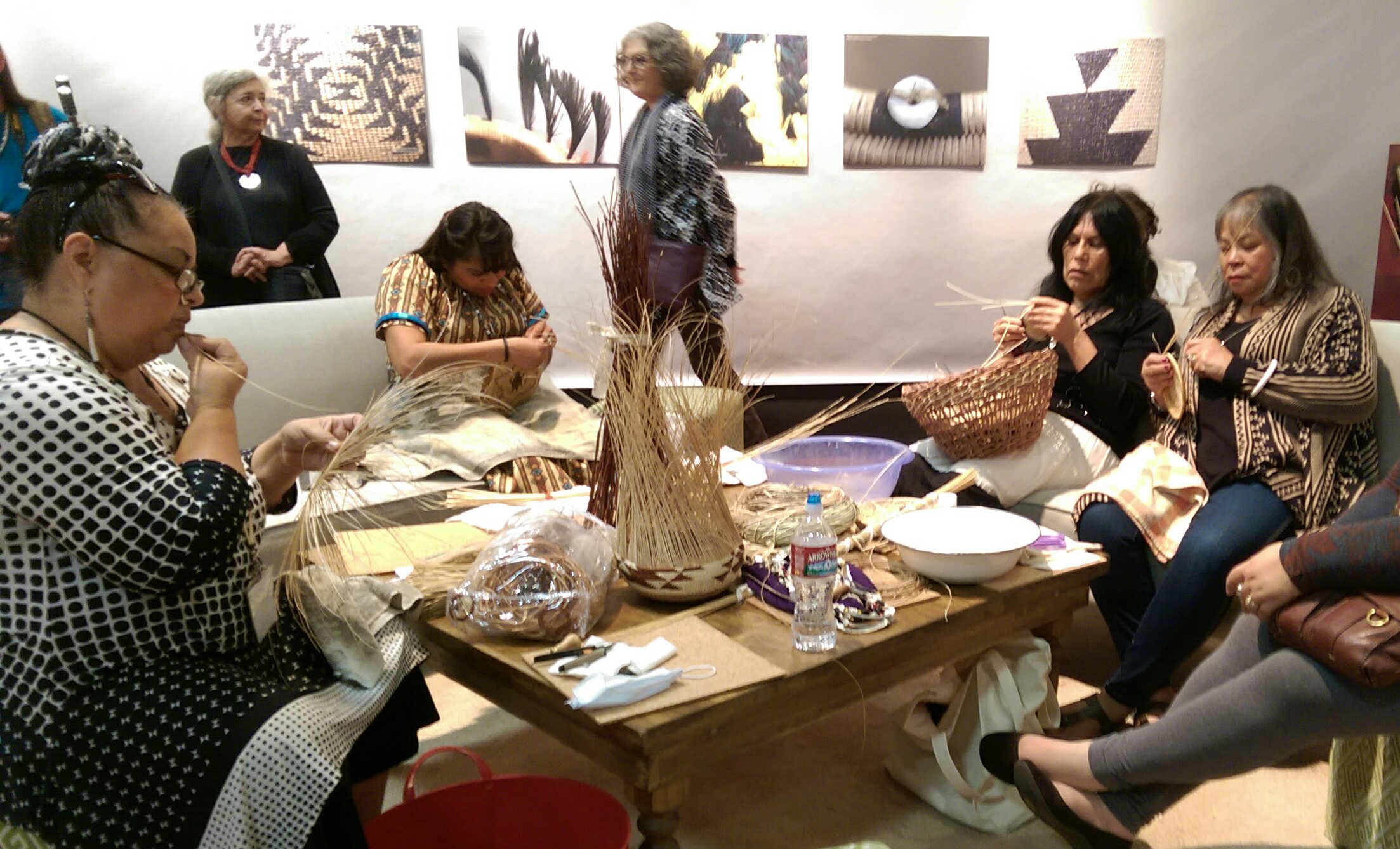Traditional Ecological Knowledge of Fire
Cultural Burning
...is a land management practice used to produce and promote particular landscape changes for cultural reasons. An example of this comes from California Indian basketmakers. Weaving these elaborately detailed baskets requires very straight and flexible plant materials which are rarely found outside of a relatively recently burned area. This means basketmakers who require these materials must forage in very specific locations for particular plants that have recently regrown after a fire. This is incredibly difficult to do if fire suppression has prevented burning of these essential plants. Unburned plants become rigid, woody, and are rarely found straight enough to be of any use making them useless to native basketmakers. These cultural traditions evolved alongside fire and its regular use on California landscapes. In fire's absence these cultural traditions can no longer be maintained. Therefore, many indigenous peoples in California today are pushing for a return to cultural burning to not only protect the ecosystems that require it but also their cultural traditions.
 |
| A group of Native American basketweavers in San Rafael, California. Photo by Jim Heaphy. |
This Traditional Ecological Knowledge, or TEK for short, is key to understanding and adapting to changes in our environment as it tells how people survived and thrived here for thousands of years. TEK of fire is not new either. As I mentioned in my previous post, California Indians have been practicing fire management for thousands of years. That is a lot of experience from which to draw on to better control fire today. Why aren't we asking indigenous Californians to teach us their land stewardship practices? Especially given our contemporary issues fighting fire catastrophes each year? Well, good news! Some people are finally asking the right questions and many Native peoples are kindly sharing this oral history and traditional knowledge!
Professors Kent Lightfoot and Scott Stephens at UC, Berkeley even teach a course about the importance of fire in our ecosystems and the role it historically played here (The course is ESPM C22AC/ANTHRO C12AC for interested learners). They are working with tribes, including the Amah Mutsun Land Trust, in California to increase fire use, tribal voices, and research on the subject. Check out some of their incredibly important work together here:
The Amah Mutsun Land Trust stewards work with UC Berkeley to uncover past ancient practices:
In this short but awesome talk, Professor Scott Stephens summarizes much of California's fire regimes, both past and present:
Indigenous voices and their traditional ecological knowledge have been silenced for too long. They have the answers to the questions the rest of us have been seeking on how to better engage with local ecology. Fire is one of these answers. Working with indigenous peoples to uncover and find better, more sustainable land management practices means a brighter future for us fire-frightened folk and tribal stewards, alike.
References
About the Book:
 "John Muir was an early proponent of a view we still hold today—that much of California was pristine, untouched wilderness before the arrival of Europeans. But as this groundbreaking book demonstrates, what Muir was really seeing when he admired the grand vistas of Yosemite and the gold and purple flowers carpeting the Central Valley were the fertile gardens of the Sierra Miwok and Valley Yokuts Indians, modified and made productive by centuries of harvesting, tilling, sowing, pruning, and burning. Marvelously detailed and beautifully written, Tending the Wild is an unparalleled examination of Native American knowledge and uses of California's natural resources that reshapes our understanding of native cultures and shows how we might begin to use their knowledge in our own conservation efforts.
"John Muir was an early proponent of a view we still hold today—that much of California was pristine, untouched wilderness before the arrival of Europeans. But as this groundbreaking book demonstrates, what Muir was really seeing when he admired the grand vistas of Yosemite and the gold and purple flowers carpeting the Central Valley were the fertile gardens of the Sierra Miwok and Valley Yokuts Indians, modified and made productive by centuries of harvesting, tilling, sowing, pruning, and burning. Marvelously detailed and beautifully written, Tending the Wild is an unparalleled examination of Native American knowledge and uses of California's natural resources that reshapes our understanding of native cultures and shows how we might begin to use their knowledge in our own conservation efforts.M. Kat Anderson presents a wealth of information on native land management practices gleaned in part from interviews and correspondence with Native Americans who recall what their grandparents told them about how and when areas were burned, which plants were eaten and which were used for basketry, and how plants were tended. The complex picture that emerges from this and other historical source material dispels the hunter-gatherer stereotype long perpetuated in anthropological and historical literature. We come to see California's indigenous people as active agents of environmental change and stewardship. Tending the Wild persuasively argues that this traditional ecological knowledge is essential if we are to successfully meet the challenge of living sustainably."
If short on time however, you may choose to watch the hour-long "Tending the Wild" PBS episode instead!
For some very interesting and detailed lectures on fire regimes, check out the videos below!
Amah Mutsun Land Trust Fire Symposium Webinar
A 2018 Fire Panel at UC Berkeley hosted by the Archaeological Research Facility
Comments
Post a Comment